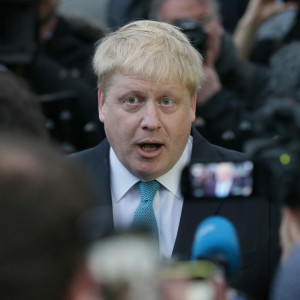Barring the political equivalent of an act of God, Boris Johnson becomes leader of the British Conservative Party and prime minister on July 22.
Johnson is a man who fails upward. So much so that he has said, “As I have discovered myself, there are no disasters just fresh opportunities. And, indeed, fresh opportunities for fresh disasters.”
Johnson has been sacked by an editor, a publisher and by his party leader. He sins, gets caught, wriggles out and comes back emboldened.
His first recorded transgression was when he got the heave-ho from The Times of London for fabricating quotes — usually a career killer. Instead, he was hired by The Daily Telegraph and sent to Brussels to cover the European Union. He covered it by minting tales of bureaucratic excess. Later, some of Johnson’s suspect reporting entered the mythology that has powered Brexit.
One fib was that the European Commission was laying down requirements for the shape of bananas imported into Europe. Another was that there were plans for the Brussels bureaucrats to build themselves a luxurious skyscraper. He was accused of fake news long before that term was in wide use.
Johnson — as journalists like to say among themselves — wasn’t one to let the facts stand in the way of a good story. His Brussels colleagues named him as the proprietor of the “mendacious smirk.” He had a way of looking to the side and down, sniggering away the evidence when his facts were challenged.
On the upside, Johnson is articulate and adept at turning disaster into, if not triumph, something that is funny or so outrageous that the blow is diverted. When, as mayor of London, he was stranded on a zipline and left hanging above the ground, he entertained film crews with hilarious commentary. Boris meets Lucille Ball.
It’s generally accepted that Johnson was an adequate mayor of London; although, like all politicians, he accepted things already in train as his creations. He’s thought to have handled London’s hosting of the Olympic Games well. He opposed the expansion of Heathrow Airport and understood the importance of city branding, saving London’s iconic double decker buses.
For five years, Johnson was editor of The Spectator, a conservative political and literary magazine. His staff there accused him of being late, disorganized and not showing up at all, charges that have clung to him everywhere he’s worked. But he was a successful editor and presided over a rise in circulation, as well as moving the content toward his own brand of liberal conservatism.
Lazy or not, Johnson’s journalistic output over the years has been considerable and includes a workman-like biography of Churchill.
As a member of parliament, which overlapped with his editorship, Johnson never reached the heights in oratory that had been expected. He described his own parliamentary speeches as “crap.”
As an after-dinner speaker, he’s been brilliant: irreverent, self-deprecating and funny. Johnson has always played the clown — and it has played well for him.
Born on Manhattan’s Upper East Side, Johnson was educated in England and took the upper middle class route through private schools, including Eton, and on to Oxford where he studied Classics. These he loved and has since cloaked himself in his familiarity with antiquity as a way of signaling superiority and intellectual weight. An example is a longish article he wrote later comparing London to Athens and, by implication, himself to Pericles.
Fun and games also have, it might be said, pervaded Johnson’s private life. When he was married to his second wife, Johnson acknowledged a child out of wedlock. When he was editor of The Spectator, the magazine was rocked with scandal. Johnson was having an affair with the top columnist; the publisher, a woman, was involved with a member of the government; and an editor was involved with a secretary. Cupid was not a spectator at The Spectator.
The sins of the flesh would have brought down other politicians, but Johnson has moved on and up. Now he is set to marry a woman 25 years his junior.
He upended his old friend David Cameron when he threw in with the Brexiteers and became the public face of Brexit. Again, facts went out the window. Johnson saw a way to power, and he grabbed it.
Now the premiership is almost his and Britain, going through turbulent times, faces an unsteady, cartoonish hand at its helm.

